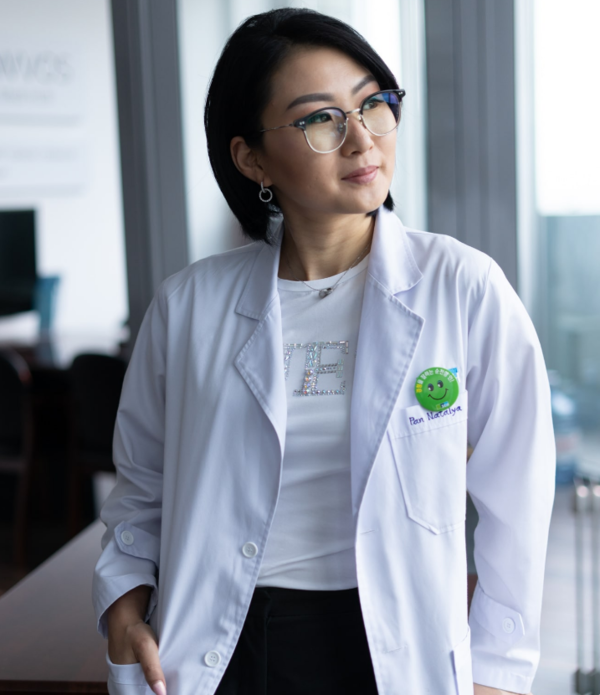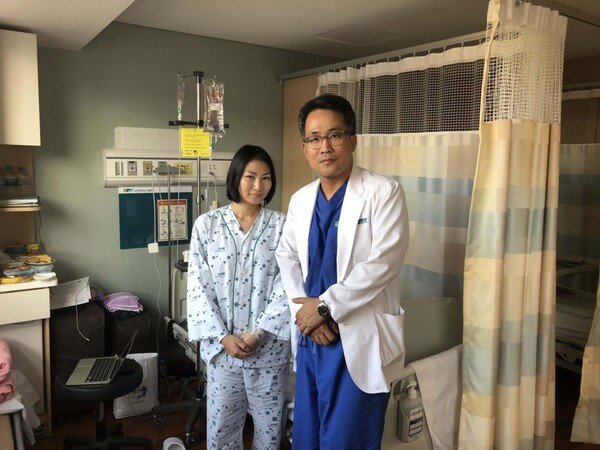In a world where access to quality healthcare remains a challenge for many, organizations such as Doctors Without Borders have garnered recognition for their commendable efforts.
However, another border-transcending organization that deserves acknowledgment is Doctor Hunter, established by Natalya Pan.

“I can point the patient in the right direction and that’s already half of the battle,” Pan, a Korean living in Almaty, Kazakhstan, said in an interview with Korea Biomedical Review.
Born out of her personal experience with cancer, Pan, 39, founded the medical tourism company in Almaty in 2016.
Now, approximately 40 staff members are connected to a network of doctors and psychologists.
For the past seven years, the company helped more than 5,000 patients from the Commonwealth of Independent States (CIS) region, formerly known as the Soviet Union, find the best doctors worldwide, she said.
From patient to medical counselor
Nine years ago, Pan was diagnosed with stage-1 cervical cancer after her third childbirth. She recalled how her battle with cancer unfolded in three countries after five years of treatment.
After coming to terms with her diagnosis, she received an operation to remove a tumor in Kazakhstan, but it didn't go according to plan so she was advised to seek medical attention either in Moscow or Korea. She chose Moscow because she speaks Russian.
Despite visiting one of the largest oncology clinics in Moscow, Pan still had to contend with long queues and unfriendly attitudes in the hospital. She was eventually able to receive the procedure and went home for further monitoring.
Two years later, she relapsed and the tumor was found in the lungs.
“I was shocked because I did not understand how the tumor originally found in the lower region of my body had now spread to my lungs,” she said.
Subsequently, Pan started considering treatment in Korea, Israel, and Germany but Korea quickly emerged as the winner as it was the most affordable option.
The doctor’s competence also reassured her trust in the Korean medical system as they were very responsive to her questions, she explained.
Pan took medications prescribed by Korean physicians in Kazakhstan but the Kazakh doctors monitoring her situation expressed skepticism about the effectiveness of the treatments. However, Korean doctors ran tests in Seoul and reaffirmed that the tumor had shrunk by more than two times.
“I realized at this point that Kazakhstan was lacking the appropriate technologies to effectively monitor the progress of the treatment in mm scale like Korea,” she said.
Pan who has been regularly frequenting different Korean hospitals during her treatment is currently 4.5 years in remission and expects to achieve full remission soon.
She mentioned that her most recent visits have been to the Soon Chun Hyang University Hospital in Seoul and Bucheon.

While continuing her treatment in 2016, Pan met Elena, another girl who was undergoing treatment for advanced-stage cancer in Kazakhstan with a mutual doctor.
Upon hearing Pan’s story, Elena asked for help to organize a trip to Korea and this became the first patient she helped achieve remission, although quite accidentally she recalled.
Pan's journey from patient to advocate has since shaped the company's core values and its commitment to patient-centric care.
"I was never good at business operation, but I love interacting with patients, so that's the role I perform in the company," said Pan, who serves as a member of the board of directors at Doctor Hunter.
Through her blog and the company website, Pan shares valuable insights, engaging with over 123,000 followers who seek guidance. Her online presence not only educates her followers about the latest cancer research and treatment methods but also provides a platform for discussions with renowned professors.
Over the years, her popularity has grown as she particularly manages to break down the intricacies of cancer into layman’s terms to aid patient understanding of their diagnoses.
The hunt for the right doctor for each patient
“Often people who receive a cancer diagnosis are in a state of despondency and disbelief so careless advice can lock them in a state of denial where they risk losing precious time,” Pan explained. “Inexperienced patients are usually confused or do not understand what exactly needs to be done.”
With a unique focus on patient recovery and personalized care, Doctor Hunter provides ongoing support, acknowledging that patients may encounter various hurdles along the journey.
"For each specific case, we do not have templates and frames and we focus on selecting the right doctors instead of clinics,” Pan said, emphasizing Doctor Hunter's philosophy to empower patients with clear action plans and connect with doctors who can provide alternatives when other specialists have already thrown in the towel.
Pan's journey as a cancer survivor still informs her meticulous selection process.
“I hunt for doctors that see the patient along with their fears and concerns rather than just the diagnosis,” she stated.
However, while the organization predominantly handles cases related to oncology, Pan also explained that its services also extend to other specialties such as neurodegenerative diseases, cardiovascular diseases, neurology, urology, ophthalmology, endocrinology, gastroenterology, and gynecology.
Medical tourism riddled with intricacies
Still, operating a medical tourism company comes with its fair share of challenges.
Pan highlights administrative complexities at clinics which often restrict access to doctors they are interested in. She also pointed out Korea Electronic Travel Authorization (K-ETA) and visa issues as another barrier for some Kazakhstan patients along with the higher cost of medicines.
However, she specifically highlighted Soon Chun Hyang University Hospital in Korea as its administrative procedures are less complicated making access to doctors easier.
Notwithstanding these challenges, Doctor Hunter remains unwavering in its mission to reduce the impact of oncology in Kazakhstan.
“Medicine continues to progress, and solutions will inevitably be found,” Pan stated. “Our mission is to reduce the death from oncology in Kazakhstan by building a diagnostic center using advanced overseas technologies to help identify the issues in earlier stages.”
In this regard, she advocated for assistance from the Korean government to help ensure a future where quality healthcare can be accessible to all.
Related articles
- Korea aims to boost foreign patient numbers by 180% by 2027, targeting 700,000 arrivals
- Korea goes all out to attract foreign patients
- Super Junior’s Ryeowook appointed as Honorary Ambassador at Medical Korea 2023
- CG Bio establishes medical aesthetics clinic on Bali Island
- What makes Korea’s dental tourism attractive?
- Vitamin D deficiency surged in Koreans. Is this overcalculated?
- Asan Medical Center partners with Lotte Hotel to attract international patients

